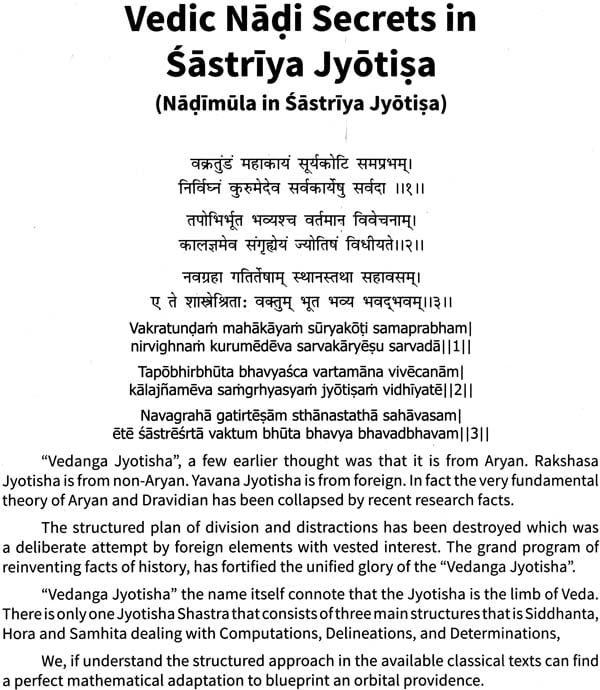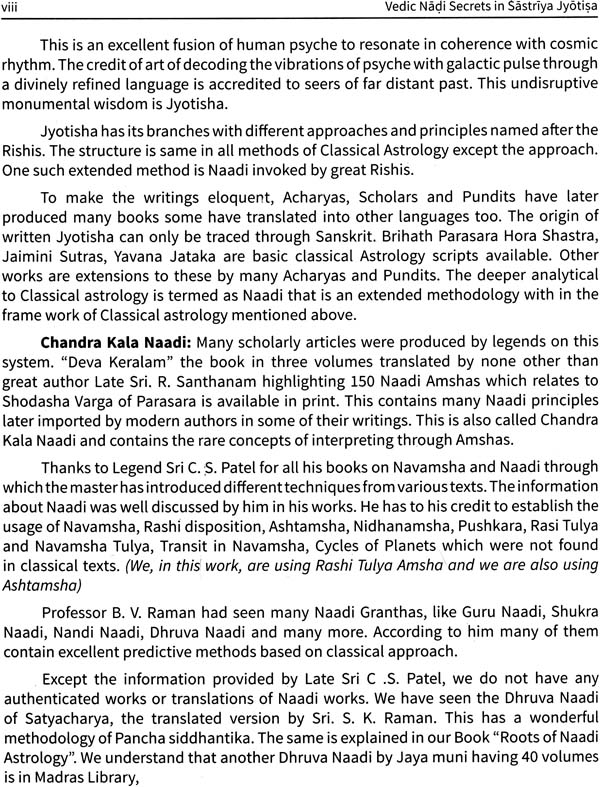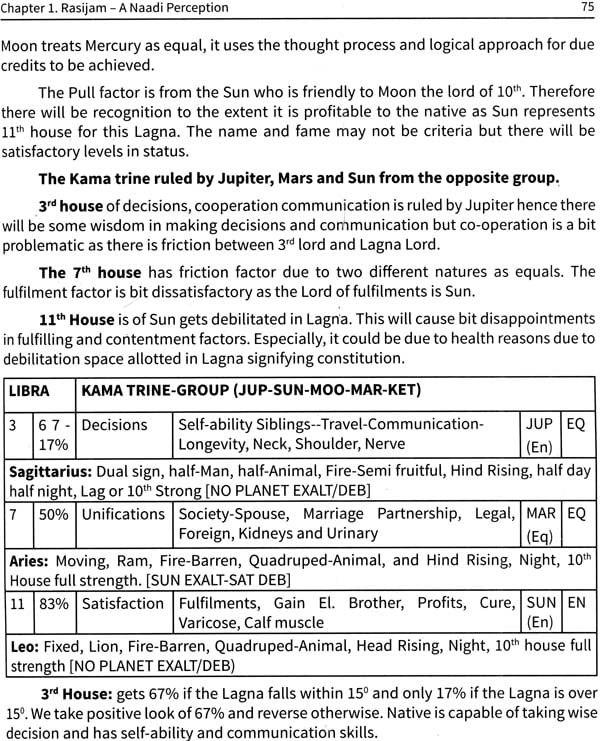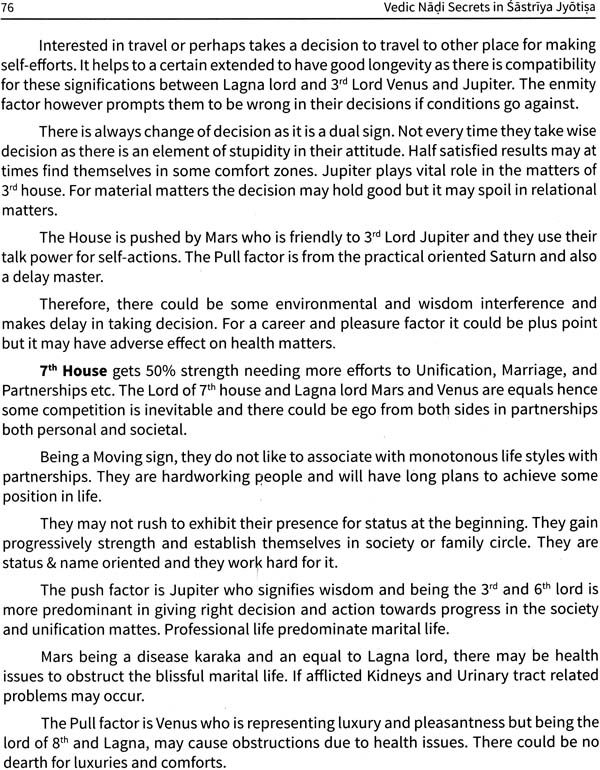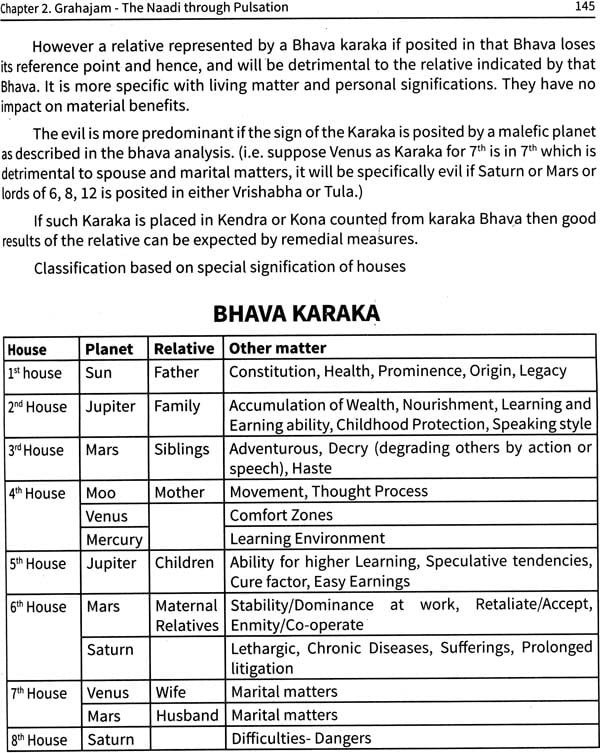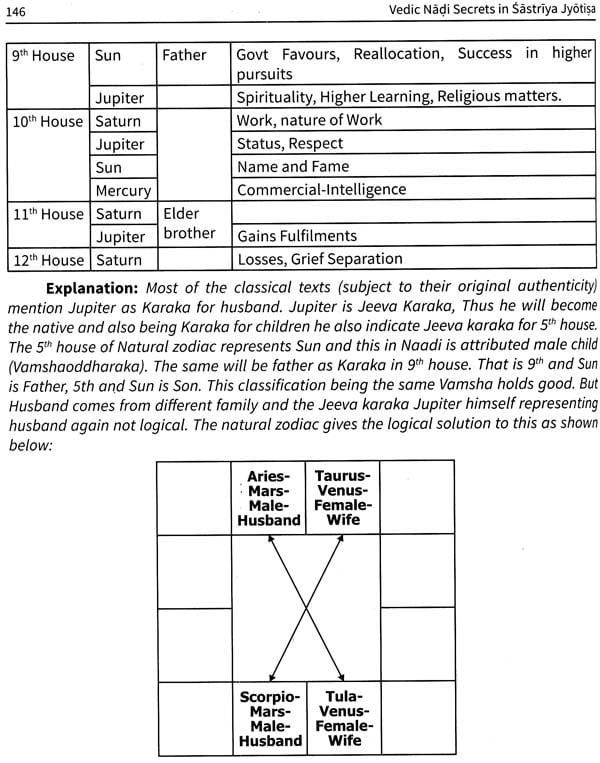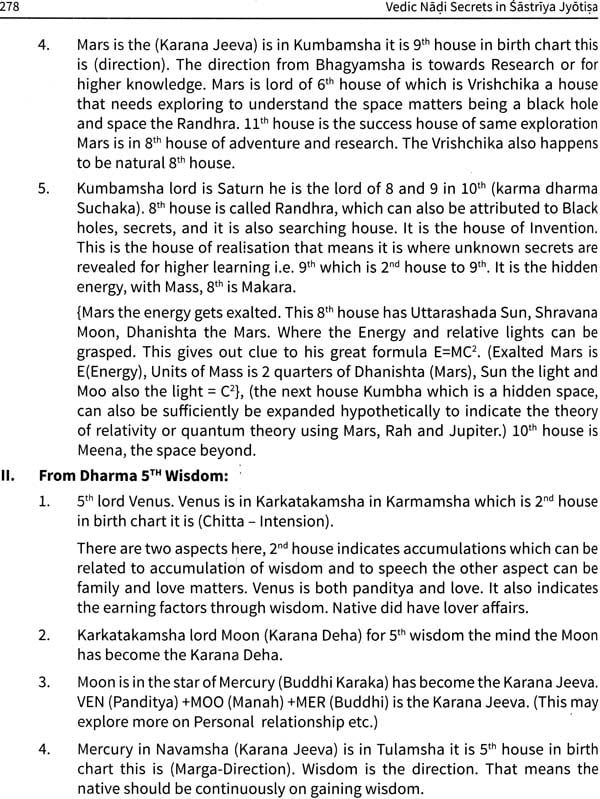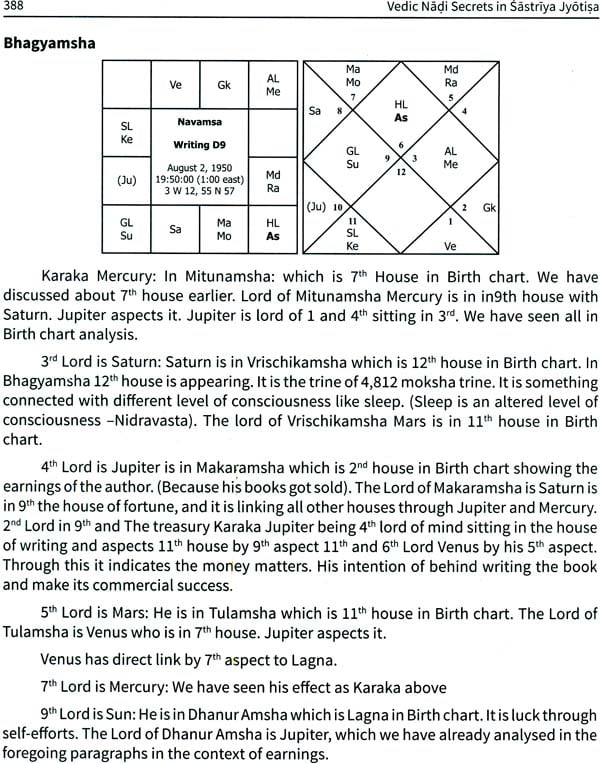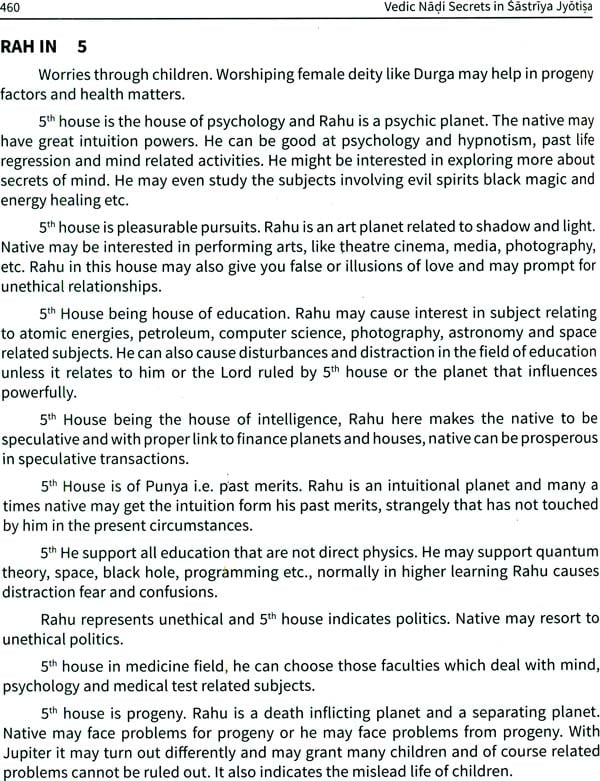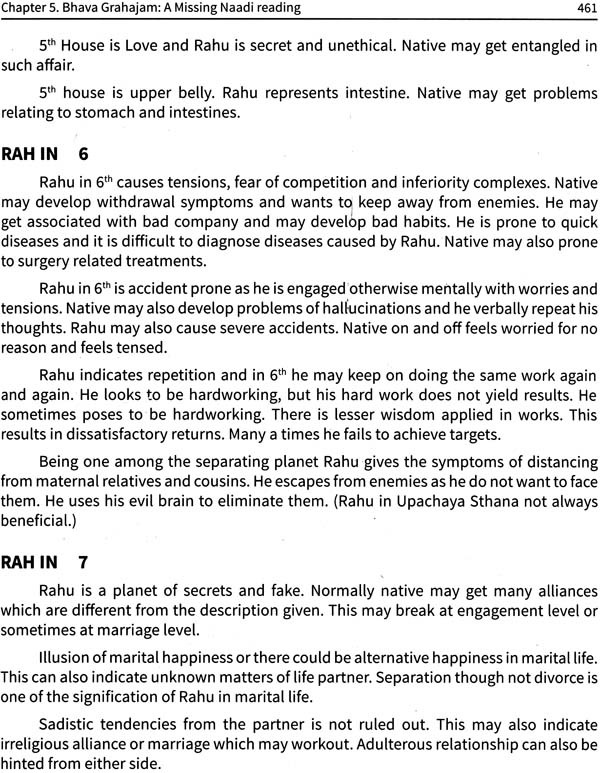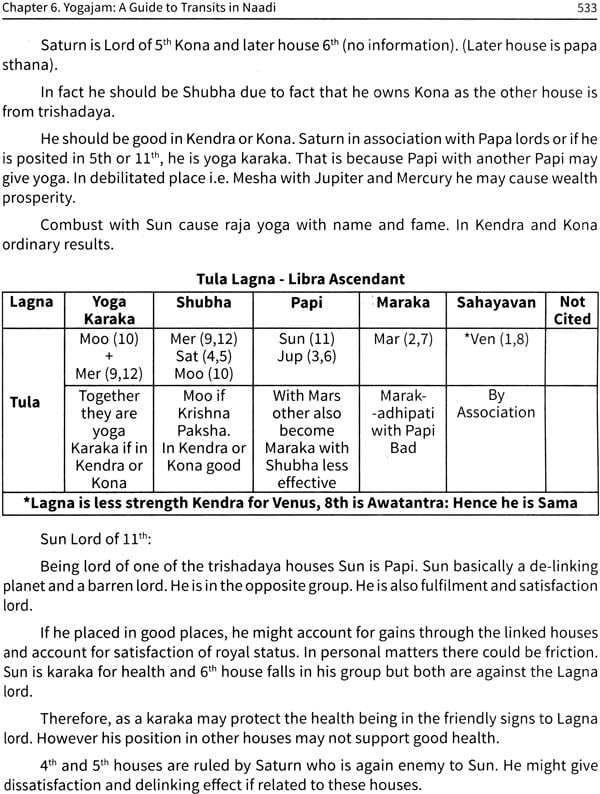
Vedic Nadi Secrets in Sastriya Jyotisa - Nadimula in Sastriya Jyotisa (An Integrated Overview)
Book Specification
| Item Code: | NAH852 |
| Author: | Satyanarayana Naik |
| Publisher: | SAGAR PUBLICATIONS |
| Language: | English |
| Edition: | 2018 |
| ISBN: | 9788170822653 |
| Pages: | 658 |
| Cover: | Paperback |
| Other Details | 9.0 inch X 7.0 inch |
| Weight | 1.20 kg |
Book Description
The contents of this book having its classical base will explore many secrets of Naadi. It is an integrated overview (not a system) having independent approaches explained for both Naadi and Classical methods. It opens up new horizons in application. This book contains a few Varga secrets which are basically Naadi approach with classical structure.
Every component is explained independently without any efforts to fuse two systems to confuse or claim discovery of a new system. This is an effort to explore the information useful for both Naadi and Traditional approach.
The Book is divided into 7 Chapters.
Rasijam: Use of minute components both of space and quality are explained. Grahajam: How the default approach is common for both Traditional and Naadi is discussed here with planetary significations and their relationship with human psychology is explored. Rasi Grahajam: Explains the use of minute components and its influences on Planets. Bhavajam: The collective signification of planets compartmentalized in 12 Bhavas and the methods of analysis as Bhava including special use of Varga in Nadi is explained. Yogajam: Planetary yoga and their effect on timing of events and their use in transit of planets in Naadi is discussed. Samayajam: A brief introduction to Dasha system is explained which will be helpful to determine the effects of planets during certain period and match the same with Nadi transits. We are sure that this Book will serve as a toolkit on both Classical and Naadi lovers.
Preface
nirvighnam kurumedeva sarvakaryesu sarvada||1||
kalajnameva samgrhyasyam jyotisam vidhiyate||2||
"Vedanga Jyotisha", a few earlier thought was that it is from Aryan. Rakshasa Jyotisha is from non-Aryan. Yavana Jyotisha is from foreign. In fact the very fundamental theory of Aryan and Dravidian has been collapsed by recent research facts.
The structured plan of division and distractions has been destroyed which was a deliberate attempt by foreign elements with vested interest. The grand program of reinventing facts of history, has fortified the unified glory of the "Vedanga Jyotisha".
"Vedanga Jyotisha" the name itself connote that the Jyotisha is the limb of Veda. There is only one Jyotisha Shastra that consists of three main structures that is Siddhanta, Hora and Samhita dealing with Computations, Delineations, and Determinations,
We, if understand the structured approach in the available classical texts can find a perfect mathematical adaptation to blueprint an orbital providence.
This is an excellent fusion of human psyche to resonate in coherence with cosmic rhythm. The credit of art of decoding the vibrations of psyche with galactic pulse through a divinely refined language is accredited to seers of far distant past. This undisruptive monumental wisdom is Jyotisha.
Jyotisha has its branches with different approaches and principles named after the Rishis. The structure is same in all methods of Classical Astrology except the approach. One such extended method is Naadi invoked by great Rishis.
To make the writings eloquent, Acharyas, Scholars and Pundits have later produced many books some have translated into other languages too. The origin of written Jyotisha can only be traced through Sanskrit. Brihath Parasara Hora Shastra, Jaimini Sutras, Yavana Jataka are basic classical Astrology scripts available. Other works are extensions to these by many Acharyas and Pundits. The deeper analytical to Classical astrology is termed as Naadi that is an extended methodology with in the frame work of Classical astrology mentioned above.
Chandra Kala Naadi: Many scholarly articles were produced by legends on this system. "Deva Keralam" the book in three volumes translated by none other than great author Late Sri. R. Santhanam highlighting 150 Naadi Amshas which relates to Shodasha Varga of Parasara is available in print. This contains many Naadi principles later imported by modern authors in some of their writings. This is also called Chandra Kala Naadi and contains the rare concepts of interpreting through Amshas.
Thanks to Legend Sri C. S. Patel for all his books on Navamsha and Naadi through which the master has introduced different techniques from various texts. The information about Naadi was well discussed by him in his works. He has to his credit to establish the usage of Navamsha, Rashi disposition, Ashtamsha, Nidhanamsha, Pushkara, Rasi Tulya and Navamsha Tulya, Transit in Navamsha, Cycles of Planets which were not found in classical texts. (We, in this work, are using Rashi Tulya Amsha and we are also using Ashtamsha).
Professor B. V. Raman had seen many Naadi Granthas, like Guru Naadi, Shukra Naadi, Nandi Naadi, Dhruva Naadi and many more. According to him many of them contain excellent predictive methods based on classical approach.
Except the information provided by Late Sri C .S. Patel, we do not have any authenticated works or translations of Naadi works. We have seen the Dhruva Naadi of Satyacharya, the translated version by Sri. S. K. Raman. This has a wonderful methodology of Pancha siddhantika. The same is explained in our Book "Roots of Naadi Astrology". We understand that another Dhruva Naadi by Jaya muni having 40 volumes is in Madras Library, Reference of Mantra Naadi and the experiences of Late Sri B .V. Raman and many other Naadi references give us information about various Naadi but not the methodology.
The Palm leaf Naadi is another method of reading through selected palm leaf by an impression of thumb. This has, for and against arguments. Nevertheless, this cannot have a methodology for learning as it is an inherited art of reading palm leaves.
Brighu Naadi - Pending translation and publication due to demise of Late Sri R. Santhanam this work remained unavailable.
Brighu Nandi Naadi - It is a translation work of Brighu Naadi and Nandi Naadi combined (mostly by charts and a few principles combined), by none other than Late Sri R.G. Rao of Bangalore both in English and Kannada.
The Book Brighu Nandi Naadi and other works on combination of planets and transit of planets by Late Sri R.G. Rao have become famous as prevailing Naadi system. This system is based on Karakatwa and combination of Planets and timing by transit.
Despite a few fanatic views by many self-claimed Naadi exponents blaming the above system and hypothetically claiming better versions of Naadi in their vernacular languages, the Brighu Nandi Naadi with missing links, is off-course an excellent version of Naadi astrology that has roots in many works like Parasara, Jaimini, and later works like Brihath Jataka, Deva Keralam etc.
There is much more to Naadi when a comprehensive study is made taking all the classical works in to consideration. The Naadi principles are embedded in all the classical works. They need to be identified or learnt through able guru to understand them elaborately. There is no necessity to have distinctive nomenclature for a partial application in Naadi and discard valuable Naadi classical dictums that are explicitly introduced in almost all Classical works of Astrology.
The present book is an effort to give a vision of hidden Naadi components in classical astrology in general and Brihath Parasara Hora Sastra in particular. Equally use the karaktva & transit principles of Naadi in conventional method.
Collective providential contra indications by sages during their sessions at the behest of lord Shiva and Parvathi, despite counter inputs emerged as fine tuning of principles that are found in many classical Jyotisha Granthas authored severally by Rishis. The Naadi roots therefore, must be traced in classical Jyotisha Granthas.
Every computation found in classical texts, which logically, intellectually and universally acceptable cannot be wrong. If any alternative calculation or dictum is found, without prejudice, it can be complementary but not contradictory.
Contents
| i | Preface | vii |
| 1 | Rasijam - A Naadi perception | 3 |
| 2 | Grahajam - The Naadi through Pulsation | 126 |
| 3 | Rashi Grahajam - Naadi Fusion Static & Dynamic Energies | 201 |
| 4 | Bhavajam - Naadi Static Indicator | |
| Part A. Naadi Vargajam Purushartha Pradhana Jeevana Marga | 250 | |
| Part B. Bhava Analysis with Karaka and Suchaka Bhava | 289 | |
| 5 | Bhava Grahajam | 435 |
| 6 | Yogajam | 496 |
| 7 | Samayajam - Dasha | 627 |
Sample Pages
